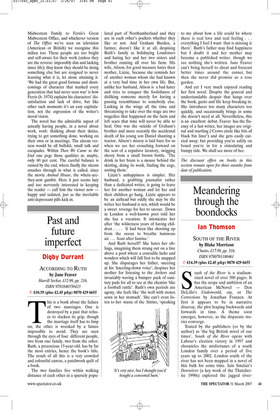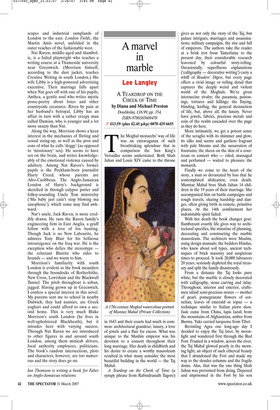Meandering through the boondocks
Ian Thomson
SOUTH OF THE RIVER by Blake Morrison
Chatto, £17.99, pp. 516, ISBN 9780701180461
✆ £14.39 (plus £2.45 p&p) 0870 429 6655 South of the River is a stadiumsized novel of over 500 pages. It has the scope and ambition of an American McNovel — Don DeLillo’s Underworld, say, or The Corrections by Jonathan Franzen. At first it appears to be in narrative disarray, the plot leaping backwards and forwards in time. A theme soon emerges, however, as the disparate stories converge.
Touted by the publishers (or by the author) as ‘the big British novel of our times’, South of the River opens with Labour’s election victory in 1997 and chronicles the misfortunes of a south London family over a period of five years up to 2002. London south of the river has not been mapped in a novel of this bulk for some time. Iain Sinclair’s Downriver (a key work of the Thatcherite 1990s) explored the jagged river scapes and industrial sumplands of London to the east. London Fields, the Martin Amis novel, unfolded in the outer reaches of the fashionable west.
Nat Raven, middle-aged and shambolic, is a failed playwright who teaches a writing course at a Thameside university near Greenwich. (Morrison himself, according to the dust jacket, teaches Creative Writing in south London.) His wife Libby is a high-powered advertising executive. Their marriage falls apart when Nat goes off with one of his pupils, Anthea, a gentle soul who writes mystic prose-poetry about foxes and other countryside creatures. Riven by pain at her husband’s betrayal, Libby has an affair in turn with a rather creepy man called Damian, who is younger and a lot more snazzy than Nat.
Along the way, Morrison shows a keen interest in the mechanics of flirting and sexual sizing-up, as well as the pros and cons of what he calls ‘doggy’ (as opposed to ‘missionary’ sex). He seems to have sex on the brain, and writes knowledgeably of the emotional violence caused by adultery. Among Nat Raven’s former pupils is the Peckham-born journalist Harry Creed, whose parents are Afro-Caribbean. The Anglo-Jamaican London of Harry’s background is sketched in through calypso patter and folksy-sounding Uncle Tom minstrelsy (‘Ma baby just cain’t stop blowing ma saxophone’), which some may find awkward.
Nat’s uncle, Jack Raven, is more credibly drawn. He runs the Raven family’s engineering firm in East Anglia, a gruff fellow with a love of fox hunting. Though Jack is no New Labourite, he admires Tony Blair for his bellicose intransigence on the Iraq war. He is the exception who defies the stereotype the reluctant Blairite who rides to hounds — and we warm to him.
Morrison’s familiarity with south London is evident as the book meanders through the boondocks of Rotherhithe, New Cross, Lewisham and the Blackwall Tunnel. The pitch throughout is urban, jagged. Having grown up in Greenwich, I confess a special interest in this novel. My parents sent me to school in nearby Dulwich; they had nannies, ate Greek yoghurt and could afford to own a second home. This is very much Blake Morrison’s south London (he lives in well-upholstered Blackheath), but it intrudes here with varying success. Through Nat Raven we are introduced to other figures in and around south London, among them minicab drivers, local authority employees, politicians. The book’s random intersections, plots and characters, however, are too numerous and the story does go on.
Ian Thomson is writing a book for Faber on Anglo-Jamaican relations.











































































 Previous page
Previous page